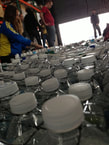
Bisphenol A (BPA) is a chemical compound commonly used in hard plastics and a multitude of everyday items such as food cans, DVD's, sports equipment, water bottles, store receipts, soda cans and much more. As a result of increasing research identifying BPA as an endocrine disruptor with a wide range of potential unhealthy physiological and neurological side effects, in 2010 New York State passed a child protection law prohibiting the use of BPA in certain products such as baby bottles and cups. In 2012, the FDA followed New York's lead and also banned BPA in baby bottles and cups. While the law made parents sigh with relief, manufacturers needed to find an alternative to BPA to maintain the structural integrity of hard plastics and similar items.
As a result, BPA was largely and quickly replaced with Bisphenol S (BPS). BPS is structurally similar to BPA and was found by companies to be an excellent substitute for BPA. Unfortunately for consumers, BPS has also been identified as an endocrine disruptor with side effects equally disturbing to those of BPA. Replacing BPA with BPS has effectively allowed companies to circumvent the consumer protection laws, without the overwhelming majority of consumers even being aware of their shell game like switch. Parents look for the "BPA Free" label with a false sense of security, before making what they believe to be an informed purchase.
Unfortunately the "sleight of hand" against consumers does not end with BPS. As consumers started to become educated on the BPS substitution and the potential harmful effects, Big Business did not want to wait until BPS became common knowledge before taking action. As a result, an alternative substitute for BPA is now already in use in conjunction with BPS and is virtually completely unknown to consumers. This substitute is Bisphenol F (BPF) and is also structurally similar to BPA, with reportedly many of the same ill effects to consumer health. In that Big Business is at a minimum two steps ahead of the law, it is virtually impossible for the consumer to identify products containing BPA substitutes such as BPS or BPF. Today BPS and BPF have reportedly been found in many everyday products such as makeup, hair care products, toothpaste, lotions, flyers, tickets, envelopes, meat, vegetables, canned foods, cereals and more.
As our children return back to school, innumerable plastic drinking bottles are being purchased for their use. These purchases are being made without full knowledge of whether or not these products contain BPA, BPS and especially the elusive BPF. In fact the only site to my knowledge that offers cups that are said to be BPA/BPS/BPF free is camelbak.com, with their stainless steel line of mugs.
Although in theory a banned chemical that is harmful to our health should be replaced with something far less toxic, the reality is something very different. Consumers must educate and disseminate information in order to survive and the internet has helped immensely to that end. But as much as consumers now know, perhaps most alarming is how much we don't know.
Long Island Lawyer
Paul A. Lauto, Esq.
www.liattorney.com


 RSS Feed
RSS Feed

